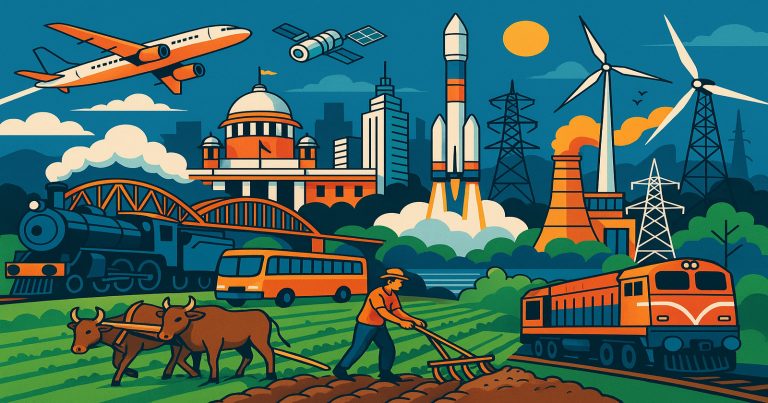Public sector industries in India are important contributors to the country’s economy toward its industrialization and socio-economic development.Public sector industries in India play a strategic role in nation-building. Public sector industries in India play a strategic role in nation-building. That’s what public sector industries do- provide development of infrastructure, generate employment, and make resources available to all. They speak volumes about the contribution of the public sector in the Indian economy. As they are owned, operated, and managed by the government, the aim is for the realization of national objectives: economic equity, resource utilization, and infrastructure development. Energy generation and transportation constitute key sectors among them. This article will discuss public sector industries: what they are, examples of their operations in India, and their importance to the nation.
What are Public Sector Industries?
Public sector industries are business enterprises owned and managed by the government, either wholly or through a majority stake, to achieve broader socio-economic objectives. These industries are primarily established to serve the public interest and ensure equitable distribution of resources.There are various types of public sector industries, including those involved in energy, banking, telecommunications, and transport. These public sector enterprises in India with examples like ONGC and SBI show the government’s reach in vital sectors
Key Features of Public Sector Industries
Public sector organizations play a key role in rendering essential services to citizens. They work for public welfare, are a people-owned body and have to abide by certain regulations to ensure true transparency and fairness.
- Ownership: Public sector organizations are entirely or mainly government-owned, ensuring accountability to citizens. The government thus is in charge of her operations to promote public interest and maintain transparency in her functioning.
- Purpose: Organizations in the public sector exist to promote public welfare and not exclusively to make profits. They specialize in the provision of services most vital to society such as health care, education, and infrastructure-all of which are geared toward improving the standard of living for all citizens.
- Regulation: These organizations function under specific laws and regulations for the sake of fairness, efficiency, and accountability. Their activities are closely scrutinized to prevent any form of resource misuse and protect public trust.
- Investment: Public sector organizations get their funding mainly from the public purse, which includes tax revenues and government budgets. It is this funding that allows them to provide services at affordable rates and to fulfill public needs rather than pursue financial profits.

Examples of Public Sector Industries in India
Public sector industries in India operate across diverse sectors such as steel, energy, banking, and telecommunications. Examples of public sector industries in India include Indian Railways, SAIL, and NTPC. These industries reflect the government’s commitment to national development and public service. Here are notable examples:
| Sector | Public Sector Enterprise | Function/Description |
| Steel & Engineering | Steel Authority of India Ltd (SAIL) | Produces steel for domestic and international markets |
| Bharat Heavy Electricals Ltd (BHEL) | Manufactures turbines, transformers, and power equipment | |
| Energy & Power | Oil and Natural Gas Corporation (ONGC) | Largest oil and gas exploration & production company |
| National Thermal Power Corporation (NTPC) | Major electricity generation company in India | |
| Banking & Finance | State Bank of India (SBI) | India’s largest public sector bank offering retail and corporate services |
| Life Insurance Corporation (LIC) | Public sector insurance company offering life and investment products | |
| Transportation | Indian Railways | Largest railway network under a single management globally |
| Air India | National carrier providing domestic and international flights | |
| Telecommunications | Bharat Sanchar Nigam Ltd (BSNL) | Telecom service provider in rural and urban India |
| Mahanagar Telephone Nigam Ltd (MTNL) | Telecom operator in metropolitan cities like Delhi and Mumbai | |
| Space & Technology | Indian Space Research Organisation (ISRO) | Space exploration and satellite launch services |
| Mining | Coal India Ltd (CIL) | Largest coal-producing company in the world |
| Petroleum | Indian Oil Corporation Ltd (IOCL) | Major petroleum refining and marketing company |
Steel and Heavy Engineering
- Steel Authority of India Limited (SAIL): Manages steel plants across the country, producing high-quality steel for domestic and international markets.
- Bharat Heavy Electricals Limited (BHEL): Manufactures heavy engineering products like turbines and generators.
Energy
- Oil and Natural Gas Corporation (ONGC): India’s largest oil and gas exploration and production company.
- National Thermal Power Corporation (NTPC): Generates electricity to meet India’s growing energy demands.
Banking and Finance
- State Bank of India (SBI): India’s largest public sector bank, providing banking services to millions of citizens.
- Life Insurance Corporation of India (LIC): A public-sector insurance giant offering life insurance and investment solutions.
Transportation
- Indian Railways: Operates the world’s largest rail network under a single management, providing affordable transportation.
- Air India: A government-owned airline offering domestic and international flights.
Telecommunications
- Bharat Sanchar Nigam Limited (BSNL): Provides telecom services in rural and urban areas.
- Mahanagar Telephone Nigam Limited (MTNL): Operates in metropolitan areas like Delhi and Mumbai.
Importance of Public Sector Industries
The public sector enterprises just mentioned are playing the pivotal role in the building of India. In addition to acting as the engine of the economy, they are providing employment opportunities and working with various sectors of society towards its welfare. Obviously, their importance is manifestly apparent in terms of their contribution towards the development of an economy. Autonomy, regional development, and sustainability are areas where they look into for balanced development across the entire country.
Economic Growth
- GDP Boosting: These are the major supplements for the economy, acting on different degrees boosting the GDP of India.
- The Backbone of Infrastructure: Oil, steel and power: these are the vital backbone sectors of the infrastructure development.
- Large Projects: Public sector industries with their investments in huge projects, prop up a thrust in the economy.
- Economic Stability: They indeed contribute to the prevailing stability in the economy by providing a steady supply of requisite goods and services.
Job Generation
The public sector has an identifiable role in the Indian economy, especially when compared with the kind of performances being exhibited in the private sector now. The stark difference between public and private centres has to do with the fact that one is social value-driven while the other is profit-oriented.
- Direct Employment: Directly employing a millions of persons at various skill sets are the public sector enterprises themselves.
- Indirect Jobs: They provide an array of induced jobs through contracts and supply chains.
- Job Opportunities: And most importantly, they have job opportunities in urban areas and also for people living in the most distant regions.
- Job Security: This has thus provided these workers with job security and other benefits, ensuring well-being.
Balanced Development Across Regions
- Local Units: State-led industries establish units in backward areas with the idea of developing the local economy.
- Infrastructure Development: Construct roads, buildings, and schools in such places; as well, build hospitals.
- Competition: By promoting local business and local suppliers, they help underdeveloped regions grow.
- The generation of employment in rural areas: These industries contribute to the reduction of migration.
Self Reliance
- Reduced Imports: These essential goods are manufactured by public sector enterprises, thus decreasing the import dependence.
- Technology Advancement: They create technologies and innovations to give strength to the industrial base of India.
- National Security: Such industries as ISRO and BHEL directly contribute to the defense and self-sufficiency of the nation.
- Resource Sufficiency: They guarantee a continuous supply of resources like energy and minerals.
Social Responsibility
- Public Welfare Community: Public sector enterprises sponsor funding community welfare programs to uplift the underprivileged.
- Basic Services: Providing clean water and sanitation while ensuring they remain affordable in healthcare.
- Environment Protection: It also supports those industries with environmental protection through green initiatives.
- Sustainable Energy: They invest in renewable energy projects to ensure future generations develop sustainably.
Public Sector Industries in India FAQs
1. What are public sector industries in India?
Public sector industries in India are businesses owned and operated by the government that aim to provide essential services, support economic development, and ensure fair resource distribution.
2. Can you name some major public sector industries in India?
Yes, major public sector industries include Indian Oil Corporation (IOC), Bharat Heavy Electricals Limited (BHEL), Steel Authority of India Limited (SAIL), and NTPC Limited.
3. What is the main objective of public sector industries?
The main objective is to promote social welfare, generate employment, boost infrastructure, and reduce regional economic inequalities.
4. How are public sector industries classified in India?
They are classified into Central Public Sector Enterprises (CPSEs), State Public Sector Enterprises (SPSEs), and Public Sector Banks or Financial Institutions.
5. What role do public sector industries play in India’s economy?
Public sector industries play a crucial role in building infrastructure, stabilizing key sectors, creating jobs, and ensuring inclusive economic growth across the country.


